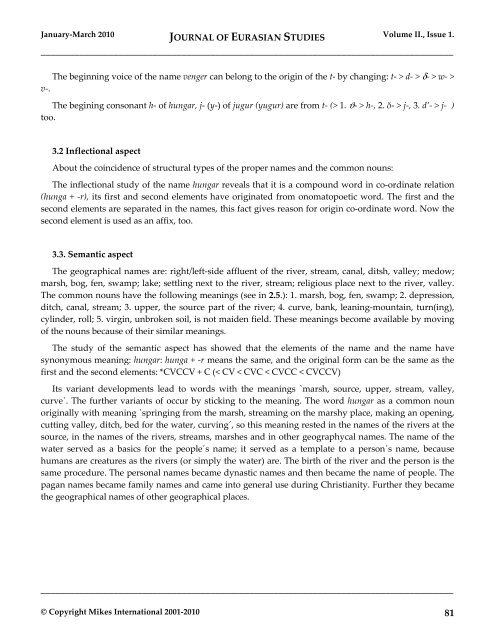EurasianStudies_0110..
EurasianStudies_0110..
EurasianStudies_0110..
Create successful ePaper yourself
Turn your PDF publications into a flip-book with our unique Google optimized e-Paper software.
January-March 2010 JOURNAL OF EURASIAN STUDIES Volume II., Issue 1.<br />
_____________________________________________________________________________________<br />
The beginning voice of the name venger can belong to the origin of the t- by changing: t- > d- > δ- > w- ><br />
v-.<br />
The begining consonant h- of hungar, j- (y-) of jugur (yugur) are from t- (> 1. ϑ- > h-, 2. δ- > j-, 3. d’- > j- )<br />
too.<br />
3.2 Inflectional aspect<br />
About the coincidence of structural types of the proper names and the common nouns:<br />
The inflectional study of the name hungar reveals that it is a compound word in co-ordinate relation<br />
(hunga + -r), its first and second elements have originated from onomatopoetic word. The first and the<br />
second elements are separated in the names, this fact gives reason for origin co-ordinate word. Now the<br />
second element is used as an affix, too.<br />
3.3. Semantic aspect<br />
The geographical names are: right/left-side affluent of the river, stream, canal, ditsh, valley; medow;<br />
marsh, bog, fen, swamp; lake; settling next to the river, stream; religious place next to the river, valley.<br />
The common nouns have the following meanings (see in 2.5.): 1. marsh, bog, fen, swamp; 2. depression,<br />
ditch, canal, stream; 3. upper, the source part of the river; 4. curve, bank, leaning-mountain, turn(ing),<br />
cylinder, roll; 5. virgin, unbroken soil, is not maiden field. These meanings become available by moving<br />
of the nouns because of their similar meanings.<br />
The study of the semantic aspect has showed that the elements of the name and the name have<br />
synonymous meaning: hungar: hunga + -r means the same, and the original form can be the same as the<br />
first and the second elements: *CVCCV + C (< CV < CVC < CVCC < CVCCV)<br />
Its variant developments lead to words with the meanings `marsh, source, upper, stream, valley,<br />
curve`. The further variants of occur by sticking to the meaning. The word hungar as a common noun<br />
originally with meaning `springing from the marsh, streaming on the marshy place, making an opening,<br />
cutting valley, ditch, bed for the water, curving´, so this meaning rested in the names of the rivers at the<br />
source, in the names of the rivers, streams, marshes and in other geographycal names. The name of the<br />
water served as a basics for the people´s name; it served as a template to a person´s name, because<br />
humans are creatures as the rivers (or simply the water) are. The birth of the river and the person is the<br />
same procedure. The personal names became dynastic names and then became the name of people. The<br />
pagan names became family names and came into general use during Christianity. Further they became<br />
the geographical names of other geographical places.<br />
_____________________________________________________________________________________<br />
© Copyright Mikes International 2001-2010 81

















